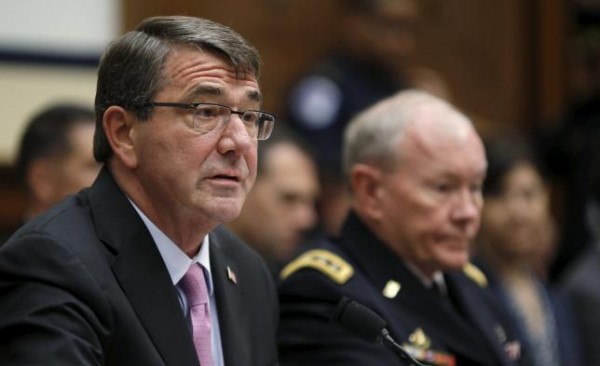
Efforts to deal the Islamic State terror group a lasting defeat in Syria have hit a “chokepoint,” with the U.S. military struggling to produce a moderate Syrian fighting force to complement American and coalition air power.
The Pentagon said Thursday that of the 6,000 volunteers for the Syria train-and-equip program, fewer than 200 have actually begun training at sites set up in Turkey and Jordan. Another 1,500 have completed the first round of screening, with 4,000 volunteers still waiting to start the vetting process.
Not a single volunteer has completed the program and returned to Syria to fight the Islamic State group.
Part of the difficulty, officials said, comes from the detailed vetting process needed to ensure each Syrian volunteer is truly a moderate willing to fight against the Islamic State group. But even once those volunteers are cleared, there is another significant challenge
“Part of the process is exfiltrating — bringing the Syrians out of Syria and getting them to a training location. This is a chokepoint,” said Pentagon spokesman Colonel Steve Warren.
“Syria is a very complex, very dangerous place, [with] multiple armed sides battling each other, so the exfiltration process is also a significant challenge,” Warren said.
Little information disclosed
Defense officials have been careful about divulging information about the program. They have refused to share start dates for each class of vetted volunteers or the number of volunteers at each training site, citing a need to ensure their safety.
Still, after already having budgeted $500 million for the Syria train-and-equip program, the Pentagon admits the progress has been below expectations, which called for an initial moderate Syrian force of 5,400.
Training sites were set up in Jordan and Turkey, with additional sites in Saudi Arabia and Qatar expected to come online as the program grew.
“We have enough training sites. For now, we don’t have enough trainees to fill them,” U.S. Defense Secretary Ash Carter told the House Armed Services Committee during a hearing Wednesday on U.S. policy in the Middle East.
In recent days, the problem of getting a U.S.-trained-and-supported force on the ground in Syria has been masked by the progress of Kurdish forces and other anti-Islamic State fighters, who have been pushing their way into the town of Tal Abyad, on the border with Turkey, with the help of U.S. and coalition air power.
The sustained Kurdish-led push, which began with the taking of Kobani back in January, has earned praise from officials. But with accusations of attempts at ethnic cleansing already straining the cooperation between Kurdish and Arab fighters, there are some who wonder how much longer the progress can be sustained.
“There are a lot of ways in which ground forces could be counterproductive in how they fight or could end up laying the seeds for future sectarian conflict, even in the short term if they push ISIL out of a city or two,” said the Brooking Institution’s Michael O’Hanlon, using an acronym for the Islamic State group.
“It matters how it is done, and I don’t think there is a good enough ground force to do the job as well as we would like to see it done,” he said.
Similar problem in Iraq
It is a problem the U.S. is also grappling with in Iraq, where U.S. train-and-equip efforts have also fallen short of expectations.
U.S. officials say only 7,000 Iraqi Security Forces troops have completed the basic training programs, while another 2,000 Iraqi forces have completed counterterror training, which includes advanced infantry training such as learning how to identify targets for airstrikes.
The combined 9,000 trained Iraqi troops, though, is far short of the 24,000 the Pentagon had hoped for.
“We simply haven’t received enough recruits,” Carter said, laying blame on the Iraqis.
“While the United States is open to supporting Iraq more than we already are, we must see a greater commitment from all parts of the Iraqi government,” he said.
VOA

Leave a Reply
You must be logged in to post a comment.